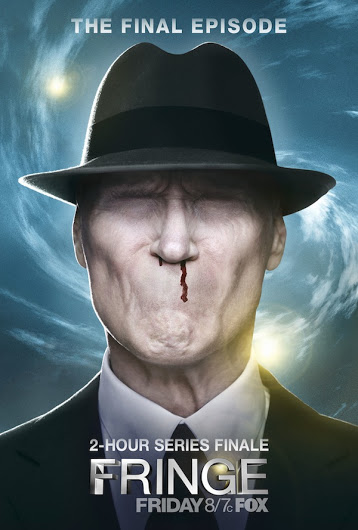 Oh, Fringe, I miss you already.
Oh, Fringe, I miss you already.
I’ve thought a lot over the past few days about the finale for the little series that could.
A part of me felt as if this last season was an add-on. I wasn’t really sure what was going on half the time, though I enjoyed it, and Olivia was sleep-walking through the whole season.
Mind you, I don’t mean that Anna Torv was sleepwalking through her role, but rather that Oliva was sleepwalking through life. It’s to Torv’s credit, in fact, taht I felt it was Olivia and not her, who was sleepwalking.
So, to recap (don’t read if you haven’t watched yet, you’ve been warned):
Nature abhors a paradox. And Walter taking Michael into the future to before the Observers’ time, to when they were first studying how to change the brain to make the most of its abilities. Before emotion was scrubbed from the (human) system.
This would show them how much more powerful the mind is with emotions than without, and Michael would never be an anomaly, but rather would be the norm.
Of course, if nature really abhors a paradox, then Michael would have to cease to exist at all, even when Olivia first found him, because he never would have existed to prove to the (closer) future that emotions were important. Which means he wouldn’t have existed to prove the importance of emotion. Which means the Observers would have existed, which means …
Well, you could drive yourself batty following it all in circles and get kinda dizzy. But I’m OK with paradoxes that contradict themselves. That’s part of what a paradox is, after all.
Whatever you think about the paradox(es), the ending of this beautiful show was true to itself.
In the end, it was about the people.
It was about Broyles, being true to himself and helping Olivia and the Bishops. It was about Olivia and Peter, the second they knew where Broyles was, not hesitating to rescue him. It was about September, showing a father’s love for Michael. It was about Walter, sacrificing himself so that his son and family could have a shot at happiness. It was about Astrid, giving Walter the gentle love of the daughter she’d grown to be to him. (Though, again, still not enough Astrid.)
It was about Walter, taking the white tulip that gave him comfort in a time of need and sending it to Peter as a farewell.
But the farewell was really to us.
Thanks. And fare the well, Bishops.